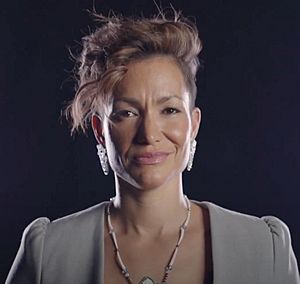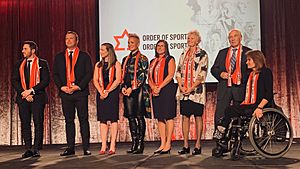Waneek Horn-Miller facts for kids

Horn-Miller in 2021
|
||||||||||||||||||||
| Personal information | ||||||||||||||||||||
|---|---|---|---|---|---|---|---|---|---|---|---|---|---|---|---|---|---|---|---|---|
| Born | November 30, 1975 Kahnawake, Quebec |
|||||||||||||||||||
| Spouse(s) | Keith Morgan | |||||||||||||||||||
| Sport | ||||||||||||||||||||
| Sport | Water polo | |||||||||||||||||||
|
Medal record
|
||||||||||||||||||||
Waneek Horn-Miller (born November 30, 1975) is a Canadian former water polo player. She comes from the Kahnawake Mohawk Territory. Waneek was part of the Canadian women's water polo team that won a gold medal. This happened at the 1999 Pan American Games in Winnipeg.
Horn-Miller also made history as the first Mohawk woman from Canada to compete in the Olympic Games. In 2019, she received the Order of Sport. This honor meant she was inducted into Canada's Sports Hall of Fame as an athlete. As a teenager, Waneek became a well-known figure during the Oka Crisis. This was a time of important discussions for First Nations people in Canada. She was involved in a difficult situation at the end of the 78-day event.
Contents
Waneek's Amazing Sporting Career
Waneek Horn-Miller was a very important player for the Canadian women's water polo team. They won gold at the 1999 Pan Am Games. She was voted the Most Valuable Player (MVP) at these games. Horn-Miller then became a co-captain. She proudly led her team at the Sydney Olympics in 2000. This was the first time women's water polo was included in the Olympics. Her team finished fifth in Sydney.
In 2000, she received a National Aboriginal Achievement Award. This award was given in the Youth category. She continued to help Canada win a bronze medal. This was at the 2001 FINA World Championships. Horn-Miller was known for her strong competitive spirit. She also had a powerful shooting arm.
After nine years on the national team, Horn-Miller left the program. She spoke openly about this decision. Later, she did not return to the team in 2004. Her coaches and teammates were then required to take special training. This training helped them understand different cultures better. It was shared that some teammates found her "intimidating." They were not always comfortable around her.
Starting Her Athletic Journey
Horn-Miller began her sports journey as a competitive swimmer. She started swimming when she was 7 years old. She later switched to water polo. This happened while she was attending Carleton University in Ottawa. There, she studied political science. Horn-Miller graduated from Carleton as a three-time athlete of the year. She is also a member of the Carleton Ravens Hall of Fame.
Between 1990 and 1997, Horn-Miller took part in the North American Indigenous Games. She won more than 20 gold medals there. One of these medals was for rifle shooting.
In 1999, Horn-Miller won the national Tom Longboat Award. This award celebrates Aboriginal athletes. It recognizes their amazing contributions to sport in Canada. In 2006, Horn-Miller was chosen as a torchbearer. She carried the torch for the 2006 Winter Olympics in Turin, Italy.
Waneek's Professional Life and Impact
In 2008, Horn-Miller worked as a broadcaster for CBC Sports. This was during the 2008 Summer Olympics in Beijing.
In October 2011, Horn-Miller joined with the Aboriginal Peoples' Television Network. They launched a program called "Working It Out Together." This program focused on fitness and healthy eating. It followed six Mohawk people as they worked towards better health.
Horn-Miller has also been a motivational speaker. In 2014, she spoke to 18,000 young people. They were from over 1,000 schools across North America. This was at WE Day in Toronto. Her message was about overcoming challenges. She also talked about making positive changes in Indigenous communities in Canada. She works against unfair treatment. She helps young Indigenous athletes work hard for their dreams.
As an inspiring speaker, she motivates young Mohawks. She wants to be a role model for kids. She encourages them to be hard-working and determined. She wants them to achieve all their goals, just like she did. Horn-Miller was inspired by Mohawk Olympian Alwyn Morris. Following his advice, she shares her achievements. She hopes to inspire others to reach for their dreams.
In November 2014, Horn-Miller was chosen for a special role. She became an assistant chef de mission for the Canadian team. This team competed at the 2015 Pan American Games. In this volunteer role, she mentored athletes. She also promoted the Pan Am Games at different events. She communicated with sports groups to make sure athletes' needs were met.
In 2015, Horn-Miller was named one of Canada's most influential women in sport. This was by the Canadian Association for Advancement of Women and Sport.
Horn-Miller also served as an ambassador for Nike's Native American initiative, Nike N7. She is currently a brand ambassador for Manitobah Mukluks. She is also the director of their Storyboot School. She received the Order of Sport in 2019. This marked her induction into Canada's Sports Hall of Fame.
In 2024, Horn-Miller was selected as a host. She joined the CBC's Primetime Panel. This was during the 2024 Summer Olympics in Paris.
Waneek's Personal Life
Waneek Horn-Miller was born in Montreal, Quebec. Her mother is former model and First Nations activist Kahn-Tineta Horn. Her father is George Miller, a Mohawk educator. She is also the half-sister of actress Kaniehtiio Horn.
She was present at the Oka Crisis when she was 14 years old. Horn-Miller spent weeks in the area where people were protesting. Her mother was working as a negotiator. "My mother, Kahentinetha Horn, is a native activist from the '60s. She was there, and my little sister and I ended up following her," Horn-Miller said. She shared this in an interview on the 25th anniversary of the event.
After 78 days, most of the protesters left. The last occupied place was a tribal center. As about fifty adults and children walked out, a difficult situation happened. Horn-Miller was leading her four-year-old sister Kaniehtiio to safety. She found herself facing a soldier. She had been injured in the chest. She and other protesters were held for 22 hours. Then she received full medical attention. She remembered a doctor telling her that if the injury had been "a centimetre either way, it would have gone right into your heart and you would have died."
In 2014, Horn-Miller was one of seven people. They were involved in a discussion with the Kahnawake Mohawk Council. This was about a policy that affected Mohawks who married non-Mohawks.
In February 2017, Horn-Miller was announced as a director. This role was for community engagement. It was for the National Inquiry into Missing and Murdered Indigenous Women and Girls. Horn-Miller stepped down from the inquiry in August.
More to Explore
- Canada women's Olympic water polo team records and statistics
- List of World Aquatics Championships medalists in water polo
 | Ernest Everett Just |
 | Mary Jackson |
 | Emmett Chappelle |
 | Marie Maynard Daly |


